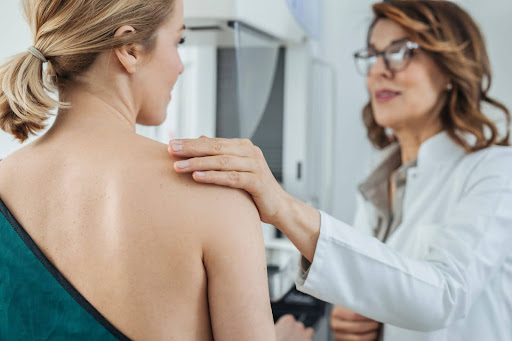 Kernodle Clinic - A DukeMedicine PRACTICE
Kernodle Clinic - A DukeMedicine PRACTICE
- Burlington 336-538-1234
- Mebane 919-563-2500
- Elon Family 336-538-2314
- Elon Pediatrics 336-538-2416
9 Tips To Reduce The Risk Of Breast Cancer

Breast cancer is a prevalent and life-altering disease that affects millions of women worldwide. According to the CDC, each year in the United States, about 240,000 cases of breast cancer are diagnosed in women. While there is no foolproof way to prevent this condition, there are several lifestyle choices and preventive measures that can significantly reduce the risk of breast cancer.
Reduce The Risk Of Breast Cancer
By adopting a proactive approach to breast health, individuals can empower themselves and make informed decisions to minimize their risk. Here at Kernodle OB/GYN, we have compiled a list of essential tips to reduce the risk of breast cancer.
1. Maintain A Healthy Weight
One of the key factors in a woman’s journey to reduce the risk of breast cancer is maintaining a healthy weight. Obesity has been linked to an increased risk of developing breast cancer, especially after menopause. Engaging in regular physical activity and adopting a balanced diet can contribute to weight management and reduce the risk of breast cancer.
2. Regular Physical Activity
Exercise not only helps in maintaining a healthy weight but also has direct benefits in reducing the risk of breast cancer. Aim for at least 150 minutes of moderate-intensity exercise per week. Physical activity can help regulate hormones and boost the immune system, contributing to an overall healthier lifestyle.
3. Balanced Diet
A nutritious and well-balanced diet is crucial for overall health and plays a significant role in breast cancer prevention. Include a variety of fruits, vegetables, whole grains, and lean proteins in your diet. Limiting the intake of processed foods and alcohol can also contribute to a lower risk of breast cancer.
4. Breastfeeding
For women who have the opportunity, breastfeeding can offer protective benefits and reduce the risk of breast cancer. Some studies even suggest the longer the duration of breastfeeding, the more pronounced the protective effect.
5. Regular Breast Self-Exams and Screening
Early detection is key in treating breast cancer successfully. Conduct regular breast self-exams to become familiar with the normal appearance and feel of your breasts. Additionally, follow recommended screening guidelines for mammograms and other diagnostic tests based on your age and risk factors.
6. Limit Hormone Replacement Therapy (HRT)
Hormone replacement therapy, often used to manage menopausal symptoms, has been linked to an increased risk of breast cancer, especially with higher-dose combination HRT. If considering HRT, discuss the potential risks and benefits with your healthcare provider and explore alternative options.
7. Limit Alcohol Consumption
There is a clear link between alcohol consumption and an increased risk of breast cancer. If you choose to drink, do so in moderation. For women, this typically means up to one drink per day.
8. Quit Smoking
Smoking is not only a risk factor for lung cancer but has also been associated with an elevated risk of developing breast cancer. Quitting smoking can have numerous health benefits, including a reduced risk of breast cancer.
9. Genetic Counseling And Testing
Individuals with a family history of breast cancer or those with specific risk factors may consider genetic counseling and testing. Identifying genetic mutations such as BRCA1 and BRCA2 can help assess the risk and guide personalized preventive measures.
Taking proactive steps towards a healthy lifestyle can significantly reduce the risk of breast cancer. Remember that early detection and prevention are key components in the fight against breast cancer, and every individual can play a role in reducing the impact of this disease. At Kernodle OB/GYN, we are gynecological healthcare specialists who can help guide you through the ways to reduce the risk of breast cancer. If you have questions or want to schedule an appointment, call (336) 538-2367.
